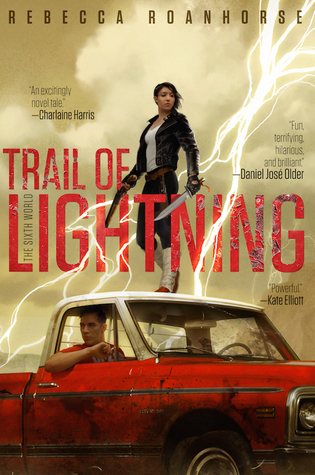Trail of Lightning (The Sixth World #1), by Rebecca Roanhorse
 Rebecca Roanhorse is a Native American and she writes of a world after an undefined global catastrophe, with the reservations united as a true separate nation. Magic is back, too, monsters and gods and everything in between with it. Our hero is a girl who was trained to kill monsters by a demigod after her grandmother was brutally murdered in front of her. She must now unravel the mystery of monsters terrorizing the land, her own emotions about the now absent demigod and solve the riddle of her own story.
Rebecca Roanhorse is a Native American and she writes of a world after an undefined global catastrophe, with the reservations united as a true separate nation. Magic is back, too, monsters and gods and everything in between with it. Our hero is a girl who was trained to kill monsters by a demigod after her grandmother was brutally murdered in front of her. She must now unravel the mystery of monsters terrorizing the land, her own emotions about the now absent demigod and solve the riddle of her own story.Trail of Lightning has an interesting story, reminded me a lot of Obsidian and Blood, by Aliette de Bodard, only that was with Aztecs and was more technical and this is more adventurous. The writing is competent, the logic holes in the story are small and forgivable. I liked that is had that Native American background, even though I felt it wasn't explored enough.
But what bothered me was the plot. It's all convoluted, but suddenly pieces fall together to further the plot or clues appear out of thin air, while things that should be immediately obvious or at least evoking curiosity are ignored and left for later when they are planned to be revealed. In the end, everything was connected. Surprise! I feel that the characters were butchered or at least boxed in by this overarching cliché of the mandatory connectivity in all things. Chekhov's Gun is important because we are talking about a violent tool for death. If a napkin is described in a scene it doesn't mean somebody is bound to blow their nose in the third act.
Bottom line: Post apocalyptic Obsidian and Blood, only not as good.
Comments
Be the first to post a comment